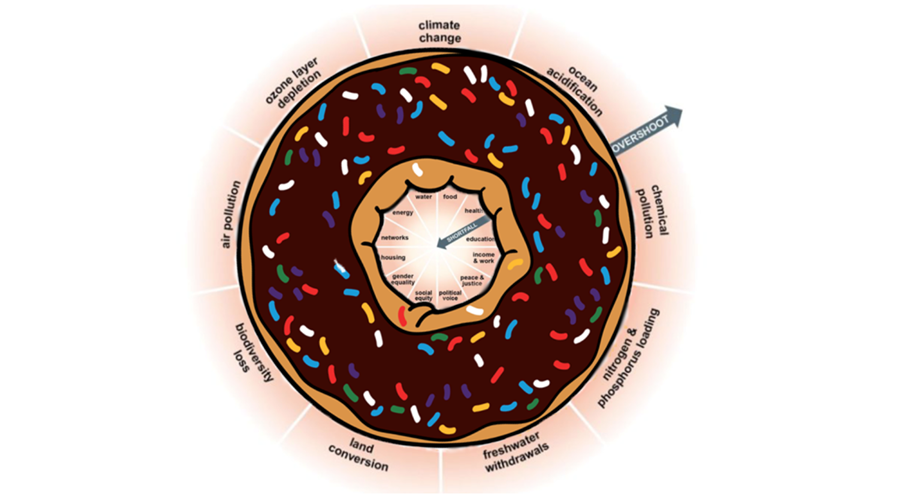Hey friends, I just got back from a work trip to Ipoh, and I’ve been sitting with something ever since. You know how some places just have a quiet kind of soul? Ipoh is one of them. Between the smell of white coffee in the old town, the charm of its street art, and those majestic limestone hills — you can feel it. But underneath all that beauty, the city is facing a big question: how do we grow without losing what makes this place so special?
That’s when I came across something called the Ipoh Doughnut Economics project — and no, it’s not about actual doughnuts (though I did have one with my coffee 😋). It’s a new way of thinking about what a healthy city looks like — one that meets people’s needs and takes care of the planet at the same time.

🍩 So… what is Doughnut Economics?
Picture a doughnut. The inside ring is about what people need to live well — things like education, fair wages, clean water, healthcare, and housing. The outer ring is nature’s limits — things like clean air, stable climate, and, yes, biodiversity.
The sweet spot? That’s the space in between — where human needs are met without pushing the planet past its limits. That’s what Ipoh is trying to create.
🌿 The Mirror Lake That Reflects More Than Just Hills
One morning, I stopped by my favourite café near Kin Long Valley, and someone told me I had to visit Tasik Cermin — Mirror Lake. So I went. And let me tell you — I get the name. This place is calm, quiet, and stunning. The still water reflects the limestone cliffs and trees like something out of a painting.
But here’s the thing: more people are discovering it, and while that’s great for tourism, it also puts pressure on the ecosystem. That’s where the Ipoh Doughnut project gets exciting — they’re working on turning Tasik Cermin into a model for eco-tourism. Not the kind that floods a place with tour buses, but the kind that protects what makes it special.
They’re planning to:
- Limit the number of visitors per ride
- Build viewing decks with sustainable materials
- Involve the local community so tourism benefits everyone
- Protect the animals and plants that call the lake home
Because here’s the truth: when we talk about biodiversity, we’re not just talking about cute animals or lush forests. We’re talking about life — the web of connections that keeps our world in balance.
🐦 Birds, Bioacoustics & What Nature Is Trying to Tell Us
Now here’s something I didn’t expect. While I was on the boat ride across the lake, I noticed birdsong all around me — gentle, bright, musical. Our guide pointed to a little device strapped to a tree. “That’s a recorder,” he said.
Turns out, researchers are using bioacoustics to study the bird population at Tasik Cermin. These recorders pick up every chirp, call, and flutter, helping scientists understand:
- Which bird species are there
- How they behave
- Whether human activity is affecting them
It blew my mind. Birds are like nature’s alarm system — if they go quiet, it’s usually a sign something’s wrong. But if we listen? We can respond before it’s too late.
https://www.instagram.com/share/_lqxDC9Of
✨ A Bigger Picture
Talking to people in Ipoh, I realised something: this isn’t just about one city. All over Asia, cities are grappling with the same challenges — climate change, inequality, vanishing green spaces. But what Ipoh is doing shows us that there’s another way forward. One where growth doesn’t come at the expense of nature. One where community, creativity, and conservation go hand in hand.
As I stood at the edge of the lake, I watched a kingfisher dart across the water, so fast it barely left a ripple. And it hit me — this is what the future could look like. A future where cities don’t just expand but evolve. Where nature isn’t something to build over, but something to build with.
Ipoh is giving us a glimpse of that future. Now it’s up to us to carry that vision forward — in every city, every community, and every choice we make.
Let’s not just grow.
Let’s grow wisely.